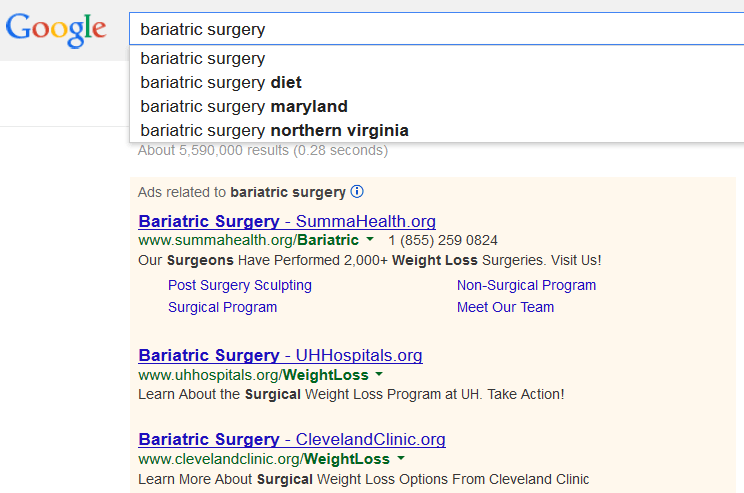More and more hospitals are trying out search engine marketing (SEM) through Google AdWords and Bing Ads as an additional way to generate incremental patients. And why not? Paid advertising is much more measurable compared to your traditional marketing efforts such as T.V., radio, and billboards. In addition, search engine marketing for hospitals targets users actively searching for information on symptoms, treatments, hospitals, etc. TV, radio, and billboard buys are a much more passive approach and typically a much more expensive one.
More and more hospitals are trying out search engine marketing (SEM) through Google AdWords and Bing Ads as an additional way to generate incremental patients. And why not? Paid advertising is much more measurable compared to your traditional marketing efforts such as T.V., radio, and billboards. In addition, search engine marketing for hospitals targets users actively searching for information on symptoms, treatments, hospitals, etc. TV, radio, and billboard buys are a much more passive approach and typically a much more expensive one.
Below are statistics from two studies on why hospitals are using (and investing more in) search engine marketing than ever before:
In 2012, Google/Compete released ‘The Digital Journey to Wellness’which states the following statistics:
Users use all devices.
- About 1/3 of patients used mobile devices (including tablets) everyday for research and/or to schedule appointments.
- Patients who used a mobile device for research were 10% MORE likely to make an appointment (at 44%) vs. computer only researchers (at 34%)
Showing up for relevant searches is necessary.
- According to Pew Internet & American Life Project (posted by Bing ads), 77% of users start at a search engine when looking for health and wellness information.
- 77% of patients used a search before booking an appointment.
- 61% of patients visited 2+ hospital sites before booking an appointment.
- 49% of searches started with Conditions/Diseases

So, now you realize why hospitals see search engine marketing as such a great channel for generating incremental patients. Here are the top five ways to be successful when running paid advertising for hospitals.
Using custom landing pages and micro-sites to rather than using pages within your web site.
- Too many times we see health systems send traffic to their homepage or pages within their web site as opposed to using PPC landing pages designed to convert users.
- Sending paid traffic to your web site will generally convert worse than landing pages and micro-sites because web sites have so much additional navigation and information that is not relevant to the users search.
- Using custom PPC landing pages will also for easier tracking to report back on performance of your media spend.
Have the right tracking in place; conversion tracking, call tracking, and analytics tracking.
- Conversion tracking allows you to see which keywords, ads, and landing page generated a form submission. This allows advertisers to determine which keywords are worth investing in and potentially which keywords are not.
- Call tracking allows you to see which campaigns (and in some cases keywords) generate phone calls, the duration, the day and time, etc. to know if your campaigns are performing and worth your investment. Some users do not want to fill out the form, so make it convenient for them to have the option to call.
- Analytics tracking will allow you to measure engagement KPI’s of your campaigns and keywords, such as average time on site, bounce rate, pages/visit and other micro-conversions to understand if the traffic is of high quality. In addition, tying Google Analytics to your search engine marketing campaigns will allow you to see attribution (i.e. how an internet user moves through various online channels (PPC, SEO, direct, referral, email, display, etc.) to eventually perform a desired action). It’s imperative your analytics is set up correctly and the code is across the entire site and web pages. Since many hospitals tend to have multiple sub-domains for different service lines, it’s important the code is set to track sub-domains correctly or the data will be invalid.
Using geo-targeting and bid modifiers to target patients closest to your hospital
- With search engine marketing, hospitals are able to target a specific DMA in which their hospital is located or even a certain number of miles in diameter around there hospital location.
- If your hospital wants to get more patients from a specific area, we can use bid modifiers to bid higher for specific zip codes, cities, etc. to make sure your ad is in a better position.

- Geo-targeting allows you to also exclude locations you do not want to promote. Many times we work with health systems and their affiliated hospitals that they do not want to compete with directly. We can exclude a specific zip, city, DMA to try to limit competing directly with each other.
Have different campaigns for each service line
- Some service lines perform better than others, some hospitals have high priority service lines and lower priority service lines, and some service lines simply have different goals for their campaigns. It’s important to have a campaign for each service line to budget media spend based on performance, priorities, and goals.
- In addition, many times service lines have different budgets. In order to easily account for media spend by service line, it simply makes sense to split each into its own campaign.
Matching search queries (searches intent) with the right offering:
Perhaps the most overlooked part for hospitals and advertisers when targeting patients is your call to action and offering.
- According to Compete and Google’s study, ‘The Digital Journey to Wellness’, 38% of searches is symptoms or departments and 37% are searches related to conditions or diseases.
- A user researching symptoms is very early in the research phase vs. a user looking for treatment is usually much further along. Therefore, you should have different offerings for these different searches.
- Users searching about risks, symptoms, pricing, etc. might be better of downloading a free guide or attending a seminar.
- Users searching for specific treatment types and options or your hospitals brand are most likely ready to schedule an appointment.
Are you using paid search as a part of your hospital’s marketing efforts?










